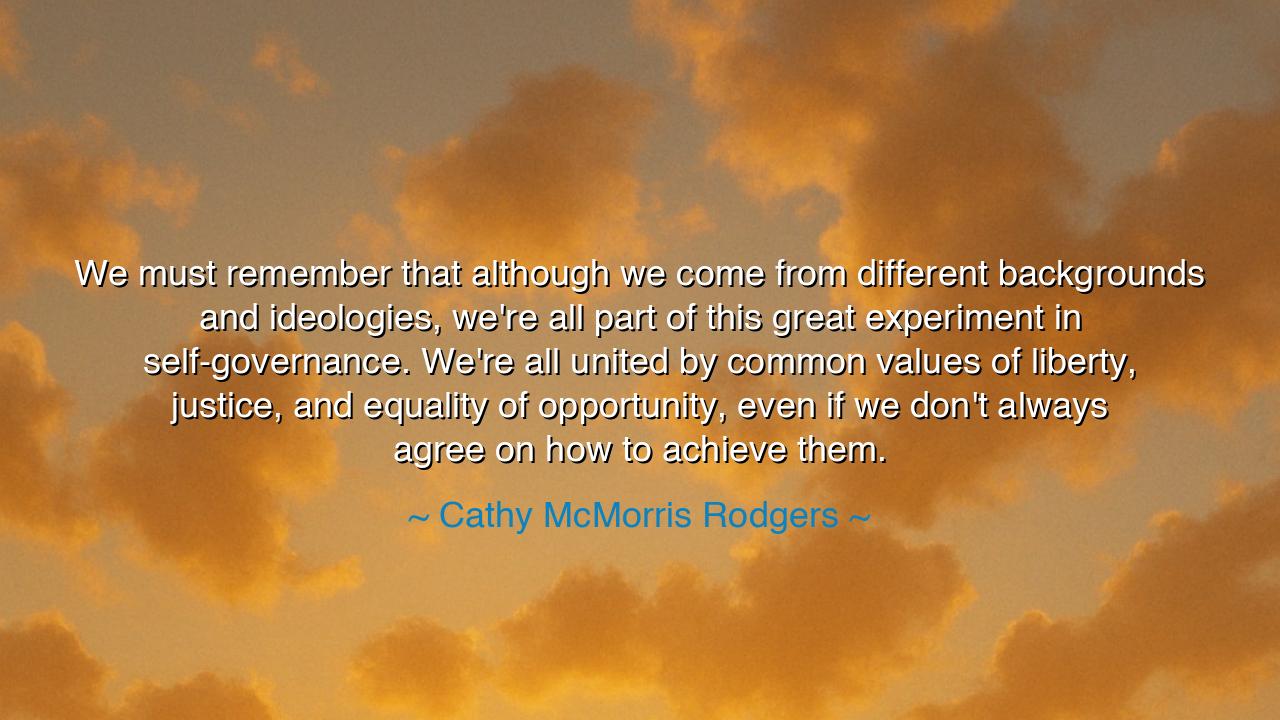
We must remember that although we come from different backgrounds
We must remember that although we come from different backgrounds and ideologies, we're all part of this great experiment in self-governance. We're all united by common values of liberty, justice, and equality of opportunity, even if we don't always agree on how to achieve them.






Hear, O listener, the steady words of Cathy McMorris Rodgers, who reminds us of a truth that is both ancient and enduring: “We must remember that although we come from different backgrounds and ideologies, we're all part of this great experiment in self-governance. We're all united by common values of liberty, justice, and equality of opportunity, even if we don't always agree on how to achieve them.” These words speak to the heart of nations, to the spirit of people who have chosen to govern themselves, and to the eternal struggle of unity amidst diversity.
She names it rightly: a great experiment in self-governance. No society is born perfect; it is crafted by countless hands, tested in fire, and refined through trials. The founders of the United States called their new nation an experiment, not a finished work, for they knew that liberty requires vigilance and justice demands sacrifice. To govern ourselves is to accept both freedom and responsibility, to create laws not imposed by kings but shaped by citizens. This is fragile and mighty all at once, a treasure always at risk of fracture when people forget their common bonds.
Rodgers calls attention to different backgrounds and ideologies. Humanity is a mosaic: varied in culture, race, faith, and thought. Differences can be seeds of division, yet they can also be sources of strength. A nation that seeks to silence diversity grows brittle, but one that weaves it into unity grows resilient. Thus, she reminds us that disagreement is not a curse, but the natural tension of a free people. The challenge is not to erase differences, but to anchor them in shared values.
And what are these shared values? She names them: liberty, justice, and equality of opportunity. These are the stars by which the republic steers its course. Liberty, the right to live without tyranny; justice, the balance that protects both the weak and the strong; and equality of opportunity, the chance for every soul to rise by merit and effort. These ideals have been proclaimed in declarations, carved into monuments, and fought for on battlefields. Yet they remain aspirations, not guarantees, for each generation must labor to bring them closer to reality.
History shows us this truth in the story of Abraham Lincoln and the Civil War. The nation was torn apart by its differences, split by ideology and background, divided by the sin of slavery. Yet Lincoln called the people back to their common values, declaring that the United States was dedicated to the proposition that “all men are created equal.” Though the war brought terrible suffering, it also renewed the commitment to liberty and justice. The experiment endured, not because the people were the same, but because they found unity in higher ideals.
The wisdom of Rodgers’ words lies in her recognition of imperfection: “even if we don’t always agree on how to achieve them.” Agreement on methods will always be rare, for humanity’s minds are as varied as its faces. But if we remember that beneath the arguments lie shared values, then debate becomes a tool for progress rather than a weapon for destruction. To forget this truth






AAdministratorAdministrator
Welcome, honored guests. Please leave a comment, we will respond soon